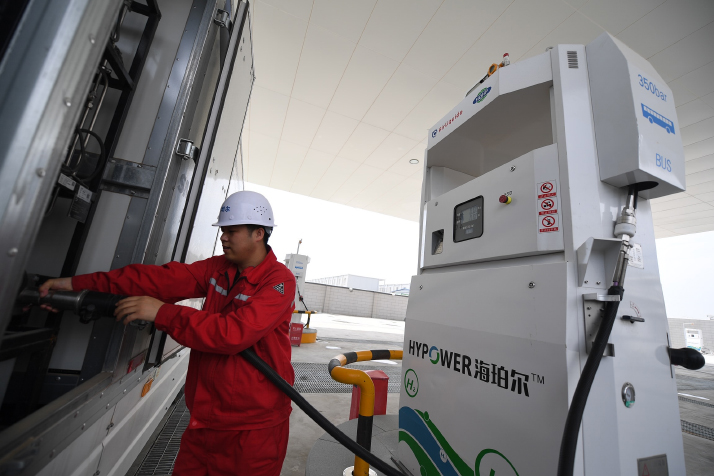| China |
| Efforts on to develop the strategic hydrogen energy industry | |
|
|
 A hydrogen refueling demonstration station in Beijing on May 10 (VCG)
When the second phase of a hydrogen energy industrial park kicked off at Yanqing, the district in Beijing that is one of the venues of the Olympic and Paralympic Winter Games in 2022, it was an indication of the growing importance of the renewable energy source in China. The project will provide clean gas for the games, powering 150 vehicles during the event. "Hydrogen energy is an important direction to explore in China's energy revolution," Li Ye, Director for Regulation at the National Energy Administration (NEA), said at an industrial seminar in Beijing in April. "At present, 23 provincial-level regions have issued plans or guidelines for advancing the industry. Remarkable achievements have been made in key and core technologies, and the development of the entire industrial chain is in good shape." Xu Guanhua, former Minister of Science and Technology and an academician of the Chinese Academy of Sciences, said in the future, hydrogen will account for 10 percent of China's energy mix. "Hydrogen and electric power will complement each other and become the major energy consumed in China, forging an emerging industry of 10 trillion yuan ($1.6 trillion)," Xu said at the seminar.  A visitor gets off from a hydrogen fuel cell bus at the Fifth World Intelligence Congress in Tianjin on May 20 (XINHUA)
Energy revolution Decarbonization is a major driving force for the development of hydrogen energy and related industries. In 2019, the development of hydrogen energy was listed a priority in the State Council's work report for the first time, and the draft Energy Law in 2020 incorporated hydrogen energy into the country's energy administration system. After President Xi Jinping announced in September 2020 that China would peak its carbon dioxide emissions before 2030 and realize carbon neutrality before 2060, the exploration of hydrogen energy has been given a new stimulus. The 14th Five-Year Plan (2021-25) for the energy sector expresses commitment to the development of hydrogen and energy storage sectors as part of the new strategic industries. In 2018, the China Hydrogen Alliance (CHA) was established by China Energy Corp. and 18 other founding members, including leading enterprises from the sectors of energy production, equipment manufacturing, transportation and metallurgical materials, as well as prestigious universities and top research institutions. It aims to build a high-end platform that enables coordinated innovation, resource pooling and commercialization of new technologies across different disciplines, sectors and departments. According to Yu Zhuoping, head of the alliance's expert panel, China's annual carbon dioxide emissions, currently standing at 12 billion tons, are estimated to peak at close to 13 billion tons before 2030. To realize the goal of carbon neutrality, the country, the world's largest energy producer and consumer, must undergo a revolution in the energy field, with low-carbon transformation of coal and oil industries. Although the proportion of clean energy in the national energy mix has increased rapidly in recent years, fossil fuels still account for 77 percent of the energy consumption. Traditional energy enterprises are facing huge pressures to reduce their carbon emissions, leading them to engage in hydrogen energy. Their involvement, in part, contributed to the rapid increase in investment in hydrogen fuel cells and related technologies, which soared from 85 billion yuan ($13.2 billion) in 2018 to 160 billion yuan ($24.8 billion) in 2020. Energy security is another major reason for the switch to hydrogen power. At present, China meets 70 percent of its oil and 40 percent of natural gas demands with overseas supplies. Developing hydrogen energy, while pursuing low-carbon development, is of st1rategic significance to reduce the reliance on energy imports, Yu added. The transportation sector is playing an important role in boosting the growth of the hydrogen energy industry. Currently, 8,000 vehicles with hydrogen fuel cells, mostly owned by public transportation and logistics companies, have been put into demonstration operation across China. China Petrochemical Corp. (Sinopec Group), one of the world's largest oil refiners and gas and petrochemical conglomerates, recently joined the CHA and set a carbon neutrality pledge by 2050. Ling Yiqun, Vice President of Sinopec Group, said the company has been planning developing new energy as a strategic emerging industry. In 2019, it produced 3.5 million tons of hydrogen, accounting for more than 10 percent of the country's total. "Sinopec Group has more than 30,000 gas stations across China, which is our advantage in laying out hydrogen refueling stations. Our goal is to establish the biggest network of hydrogen refueling stations in the country," Ling told Economic Daily. Still at initial stage However, according to Li, the global hydrogen energy industry is still at the initial stage of developing key technologies. For business models, the industry is still at the exploration stage. It is also the case in China. In December 2020, the CHA issued a report on standards of hydrogen as a clean and renewable energy. According to the report, the source of hydrogen energy produced in China is still fossil fuels. Although a prominent feature of this round of development is significant technological breakthroughs, the country is still behind international advanced levels. This makes it necessary for China to accelerate innovation and enhance the capacity in basic research. "There are still some prominent problems in developing the hydrogen energy industry, such as relatively weak foundations in some regions, poorly developed key technologies and equipment in hydrogen energy and fuel cells, and incomplete technology standards, testing and certification requirements, as well as supervision system," Li said. He emphasized that China needs to focus on the storage, transportation, refueling and diversified application of hydrogen energy. At present, China has the world's largest hydrogen production capacity standing at 41 million tons per year. Its annual hydrogen demand will increase from 33.42 million tons to around 130 million tons by 2060, accounting for 20 percent of the national energy consumption, according to a white paper on the hydrogen energy and fuel cell industry issued by the CHA in 2020. "Of the 130 million tons of hydrogen needed every year, 100 million tons will be produced from renewable energies. The cost of hydrogen production from renewable energies is expected to be reduced significantly by 2030," Yu said. (Print Edition Title: New Power Buzzword) Comments to zanjifang@chinafrica.cn |
|
||||||||||||||||||||||||||||||
|